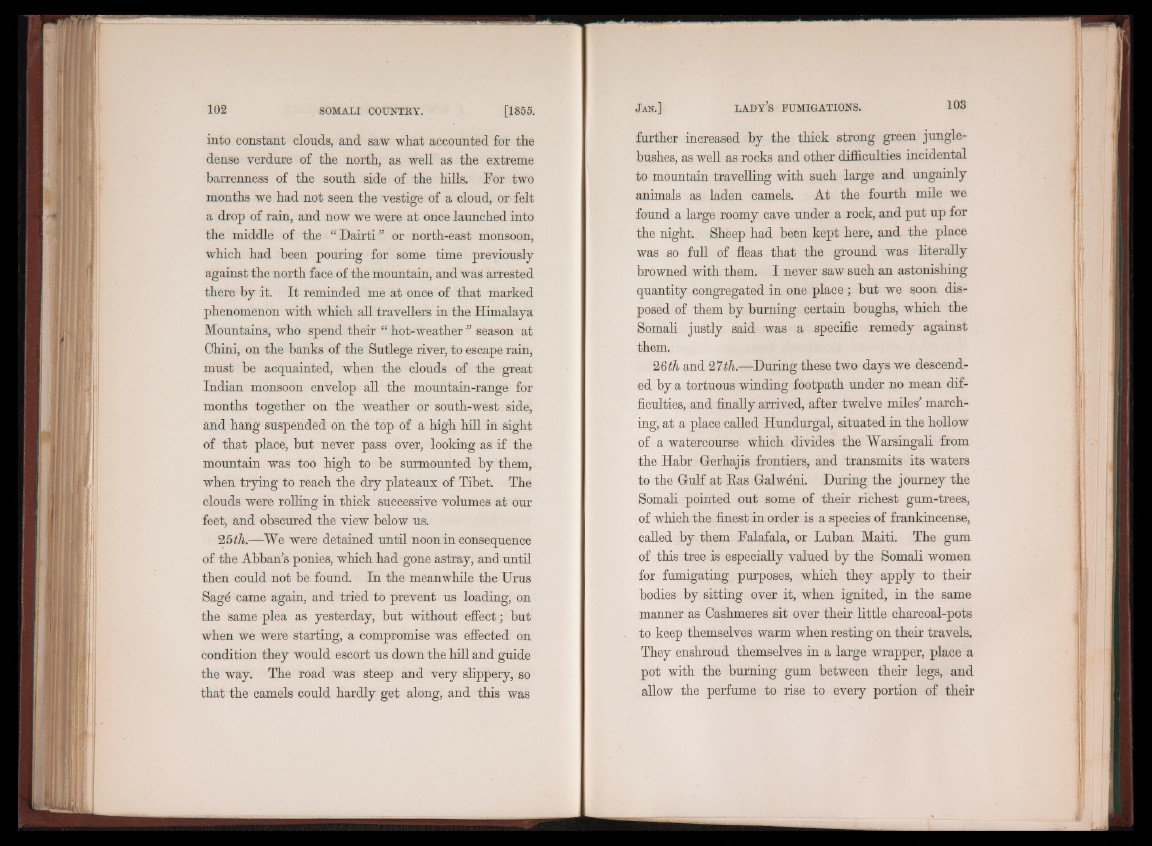
into constant clouds, and saw what accounted for the
dense verdure of the north, as well as the extreme
barrenness of the south side of the hills. For two
months we had not seen the vestige of a cloud, or felt
a drop of rain, and now we were at once launched into
the middle of the “ Dairti” or north-east monsoon,
which had been pouring for some time previously
against the north face of the mountain, and was arrested
there by it. I t reminded me at once of that marked
phenomenon with which all travellers in the Himalaya
Mountains, who spend their “ hot-weather ” season at
Chini, on the banks of the Sutlege river, to escape rain,
must be acquainted, when the clouds of the great
Indian monsoon envelop all the mountain-range for
months together on the weather or south-west side,
and hang suspended on the top of a high hill in sight
of that place, but never pass over, looking as if the
mountain was too high to be surmounted by them,
when trying to reach the dry plateaux of Tibet. The
clouds were rolling in thick successive volumes at our
feet, and obscured the view below us.
25th.—We were detained until noon in consequence
of the Abban’s ponies, which had gone astray, and until
then could not be found. In the meanwhile the Urus
Sagd came again, and tried to prevent us loading, on
the same plea as yesterday, but without effect; but
when we were starting, a compromise was effected on
condition they would escort us down the hill and guide
the way. The road was steep and very slippery, so
that the camels could hardly get along, and this was
further increased by the thick strong green jungle-
bushes, as well as rocks and other difficulties incidental
to mountain travelling with such large and ungainly
animals as laden camels. At the fourth mile we
found a large roomy cave under a rock, and put up for
the night. Sheep had been kept here, and the place
was so full of fleas that the ground was literally
browned with them. I never saw such an astonishing
quantity congregated in one place; but we soon disposed
of them by burning certain boughs, which the
Somali justly said was a specific remedy against
them.
26th and 27th.—During these two days we descended
by a tortuous winding footpath under no mean difficulties,
and finally arrived, after twelve miles’ marching,
at a place called Hundurgal, situated in the hollow
of a watercourse which divides the Warsingali from
the Habr Gerhajis frontiers, and transmits its waters
to the Gulf at Eas Galwdni. During the journey the
Somali pointed out some of their richest gum-trees,
of which the finest in order is a species of frankincense,
called by them Falafala, or Luban Maiti. The gum
of this tree is especially valued by the Somali women
for fumigating purposes, which they apply to their
bodies by sitting over it, when ignited, in the same
manner as Cashmeres sit over their little charcoal-pots
to keep themselves warm when resting on their travels.
They enshroud themselves in a large wrapper, place a
pot with the burning gum between their legs, and
allow the perfume to rise to every portion of their